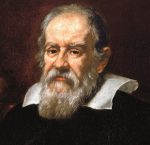Galileo di Vincenzo Bonaiuti de' Galilei, also known as Galileo Galilei or just Galileo (15 February 1564–8 January 1642), was an Italian astronomer, physicist, and engineer who was frequently referred to as a polymath. He was born in Pisa, which at the time belonged to the Duchy of Florence. The scientific method, modern-era classical physics, observational astronomy, and modern science have all been credited to Galileo.
Galileo engaged on practical science and technology, detailing the characteristics of the pendulum and "hydrostatic balances" in addition to studying speed and velocity, gravity and free fall, the theory of relativity, inertia, and projectile motion. He developed the thermoscope, created several military compasses, and made use of the telescope to make studies of celestial objects for science. He created a better telescope and used it to study the Milky Way's stars, Venus's phases, Jupiter's four greatest satellites, Saturn's rings, the moon's craters, and sunspots. He also created the first microscope.
In Dialogue Concerning the Two Chief World Systems (1632), Galileo later defended his ideas. This work appeared to criticize Pope Urban VIII, alienating the Pope and the Jesuits, who had previously backed Galileo. When the Inquisition tried him, they declared him to be "vehemently suspect of heresy" and made him retract his statements. He was placed under home arrest for the remainder of his life. In Two New Sciences (1638), he summarized studies he had completed around 40 years previously and focused mostly on kinematics and material strength.
Family And Life
The first of Vincenzo Galilei's six children, Galileo was born in Pisa, Italy, on February 15, 1564. Vincenzo was a lutenist, composer, and music theorist who had wed Giulia Ammannati in 1562. Galileo went on to become a skilled lutenist and would have picked up a skepticism for authority from his father at a young age.
Galileo had five siblings, three of whom lived through infancy. The financial strains Galileo endured for the remainder of his life increased when the youngest, Michelangelo, also trained as a composer and played the lute. Because Michelangelo was unable to give his fair portion of the dowries their father had promised, his brothers-in-law would later try to take legal action to recover the money they were owed. Galileo occasionally had to lend money to Michelangelo to support his musical endeavors and travels. It's possible that Galileo's early drive to create innovations that would earn him more money was influenced by his financial struggles.
Scientific Achievements
Speed of light
Galilean invariance
Sound frequency
Pendulum clock
Etc.

